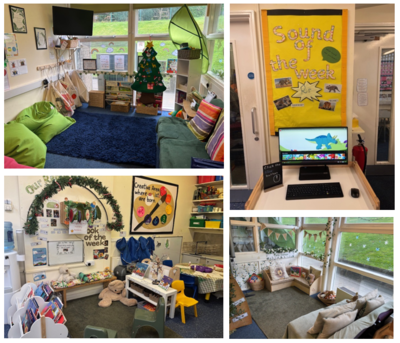Learning and Development
Literacy
Sharing Good Practice
 Since the Get Bolton Reading conference we (Egerton Nursery) have made the following changes:
Since the Get Bolton Reading conference we (Egerton Nursery) have made the following changes:
- Changed the story time.
- Reduced our group size for story, pre phonics and circle time.
- Made the story areas cosy and inviting.
- Promote independence by choosing a story.
- Created lots of story sacks with lots of interactive items and props.
In addition, since one of the girls attended the Learning Lady course, we have implemented a sound of the week. We focus on the sounds we hear in the environment, or the sounds animals make. E.g., our sound of the week on the picture is 'R' for 'Roar', and we have used pictures of dinosaurs and lions.
Learning to Read
"Reading and writing float on a sea of talk" James Britton.
The development of children’s spoken language underpins all seven areas of learning and development. Reading frequently to children and engaging them actively in stories, non-fiction, rhymes, and poems, and then providing them with extensive opportunities to use and embed new words in a range of contexts, will help children thrive. Through conversation, storytelling and role play, where children share their ideas with support and modelling from their teacher, and sensitive questioning that invites them to elaborate, children become comfortable using a rich range of vocabulary and language structures. It is crucial for children to develop a life-long love of reading. Reading consists of two dimensions: language comprehension and word reading. For more information see pages 9 and 10 of the EYFS Statutory Framework, link below.
The Statutory Framework for the Early Years Foundation Stage - Educational Programme for Literacy Development sets out activities and experiences that must be provided for children from birth to five.
- Early years foundation stage (EYFS) statutory framework - GOV.UK (www.gov.uk)
- Help for early years providers : Reading comprehension (education.gov.uk)
- Help for early years providers : Exploring words (education.gov.uk)
Earlier this year, Emma Spiers, The Learning Lady, talked to us about "What is Reading in the EYFS". Click on the play button on the image below to hear what Emma has to say.
Get Bolton Reading and Start Well Stories
The Get Bolton Reading Campaign proudly presents 'Start Well Stories', a carefully curated collection of 12 captivating storybooks (voted for by you), dedicated to fostering a love for reading and cultivating essential skills in children under three and over three, with a key focus on bridging the word gap.
For our young learners under three, Start Well Stories offer a world of delight and learning. Through engaging illustrations and accessible vocabulary, these stories aim to enhance language skills, making reading a joyful and enriching experience.
As children progress into the over three category, the ambition of the Start Well Stories escalates... These books lay the foundation for lifelong literacy, introducing a diverse range of vocabulary and emphasising the significance of phonics.
Start Well Stories for under three's:
Baby Touch and Feel: Animals
The Animal Boogie
Brown Bear, Brown Bear, What do you see?
Ten Little Fingers and Ten Little Toes
Dear Zoo
The Very Hungry Caterpillar
Start Well Stories for over three's:
The Gruffalo
The Runaway Chapati
We’re Going on a Bear Hunt
Handa’s Surprise
Wonky Donkey
Owl Babies
Get Bolton Reading Resource Booklet
This booklet includes the 12 Start Well Stories, with a linked song or rhyme Activity Card and Blank Level Questions. Click on the images in the document to access the resource. For quick reference, download, print, cut and stick the Activity Card and Blank Level Questions in each book from your library.
Bolton Start Well: Get Bolton Reading Resource Booklet (12 Start Well Stories)
Blank Level Questions NEW!
We have published a new set of Blank Level Questions to complement the Get Bolton Reading Campaigns 'Start Well Stories', Feel free to print these, cut, and stick them inside your Start Well Stories for quick reference.
For those new to Blank Level Questions, these offer a way to structure questions at different levels of understanding, ranging from Level 1 (which includes naming items) to Level 4 (involving problem solving and answering 'Why?' questions). For more information about Blank Level Questions and how to use them (a document also suitable for families) refer to: Blank Level Questions EYCLDS Pack and the Blank Level Questions Quick Reference Handout.
Home Learning Environment
We firmly believe that families play a crucial role in a child's education, and to that end, our Home Learning Environment pages will provide valuable tips for parents, enabling them to actively participate in their child's learning journey and bridge the word gap from home.
Resources to Support the Literacy Development Curriculum
Learning and Development: Raising Early Achievement in Literacy (REAL) – Bolton Start Well
Daycare settings and schools have been 'making it REAL in Bolton'! Find out more about the REAL programme, who's already involved and more.
Literacy - Help for early years providers - GOV.UK (education.gov.uk)
Access resources, activity ideas and advice for teaching literacy skills to early years children.
Why is reading for pleasure important? And what does it look like? | Bolton Learning Together website
A really useful webpage created by a collaberation of Bolton organisations with the aim to help inspire Early Years Practitioners to development a love for reading in the home learning environment. On this page you'll find links to the benefits and evidence based research on reading for pleasure and tips to plan for reading for pleasure in your learning environment and at home.
The Book Trust: How does reading benefit children?
This sets out the extensive and wide ranging benefits that reading can bring children, in a simple and accessible format.
The National Literacy Trust: Children and young people’s access to books and educational devices at home during the cost-of-living crisis
See the key findings from this survey which explored the impact of the cost-of-living crisis on children’s access to books and educational devices (e.g. child-friendly tables, e-readers and audio players) at home.
Top tips for sharing books (greatermanchester-ca.gov.uk)
The Top Tips for Sharing Books are part of Greater Manchester’s work to give every child the best start in life. Find out more at greatermanchester-ca.gov.uk. You can also find more tips, advice, activities, and short films at: www.bbc.co.uk/tinyhappypeople.
Training and Development
Bolton early years providers can access free E-learning training modules including:
Reading Case Studies and Best Practice in the EYFS
Take a look at the resources, activities, and team development ideas that have made an impact on reading development in the following settings.
Leader and Manager Resources to Review Reading Practice
Boosting pre-phonic skills with everyday routines for children under 3
- Daily Pre-Phonics Skills for Pre-school Children
- Word recognition and pre-phonics practitioner confidence questionnaire and resources
- Understanding and supporting phonics progression reflective tool
- The 7Ps for joint observation tool

